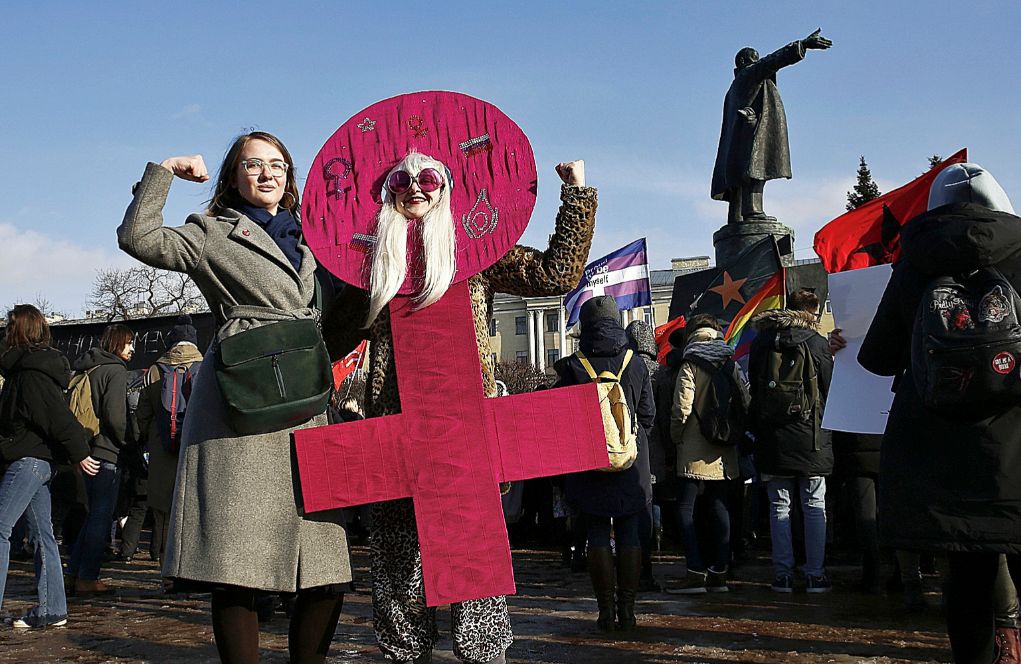- The correspondent's look: Russia: ship captains yes, mining companies no
- Event: a Russian historian is rescued in a river with body parts of his sentimental companion in a backpack
Russia does not have a law against gender violence nor does it need it, because the scale of the problem in this country "has been exaggerated." This is at least seen by the Russian Government, which has responded by letter to the claims of the European Court of Human Rights on four cases of abuse that were not properly investigated in the judgment of the victims. Moscow even maintains that "there is no evidence" that the majority of victims of domestic violence in Russia are women.
The most famous case of the four stories is that of Margarita Gracheva, who was beaten by her husband when she asked for a divorce. The police ignored her complaints, after which the husband took her to the forest, where he cut off his hands with an ax. He was sentenced to 14 years, but in two other cases referred to the court the Russian justice did not even open a criminal process and, in another case, it was a woman who was convicted of facing the attacker.
The Russian Government acknowledges that "the phenomenon of domestic violence exists in Russia, as in any other country," according to the letter written by Deputy Minister of Justice, Mikhail Halperin , released yesterday by the Russian newspaper 'Kommersant'. The difference is that in Russia in the last two years the legal situation has not only not improved: the Russian Government has softened the punishments of those who beat their spouses.
In January 2017, some forms of domestic violence were decriminalized by Parliament (385 votes against two) with the subsequent endorsement of the president, Vladimir Putin. Now, if someone in Russia beats their spouse (or any member of their family) but not strong enough to have to be hospitalized, and if they do not have a record, the two-year prison sentence no longer applies as stated the law above. Instead, you will receive a fine of up to 400 euros or instead up to 15 days in prison. Russian parliamentarians allege that the new legal approach protects family unity: it prevents police from interfering in matters between husband and wife . The law was instigated by an ultraconservative deputy, Yelena Mizulina , who at the time argued that it made no sense to separate families by "a slap".
One in three Russians suffers some form of physical abuse by their partners throughout their lives, according to the Anna Foundation, which helps battered women. Critics of the legislative change believe that the introduction of the so-called 'slap law' is normalizing the increase in violence against women. The month after the law was passed, the mayor of Yekaterinburg, the fourth largest city in Russia, reported a dramatic increase in daily warnings since the legal change : from 150 to 350 a day.
The fear of 'discrimination against men' has ideological roots in the Kremlin
Russia is still overcoming the horrific crime committed by Russian historian Oleg Sokolov, in pretrial detention for having killed and dismembered his former student and sentimental partner Anastasia Yeschenko . Now, this letter from the Ministry of Justice removing iron from sexist crimes has caused outrage among many Russians. The text even points out that these four women victims of gender violence with their complaints "misunderstand the general situation with domestic violence in Russia" and "undermine the legal mechanisms that already exist in Russian legislation, as well as the Government's efforts to improve situation". The authorities even suggest that in a situation of domestic violence, men "are more likely to suffer discrimination", since they do not ask for protection.
"The position of the Ministry of Justice is divorced from reality," lawyer Olga Gnesdilova , who represents one of the plaintiffs, tells EL MUNDO. Gnesdilova believes that this fear of "discrimination against men" has ideological roots in the Kremlin. One of the main advisers of the Russian president, Vladislav Surkov , signed an article last year in which he suggested that "political systems attract women when they are exhausted" and warned that "in the West matriarchal democracy is replacing democracy liberal".
Several companions of Gnesdilova are promoting a project so that Russia has a domestic violence prevention law at once, and they have denounced to the police that they are receiving threats on social networks. A bill of this type was first introduced in 2016, but the first reading did not pass. This summer, the president of the Federation Council (Senate), Valentina Matvienko , surprised her own and strangers by admitting the need to develop a law on domestic violence. In October, deputies began discussing a new draft. Therefore, this letter from the Government has fallen like a jug of cold water. The ministry said last night that its comments were "taken out of context."
Meanwhile, Orthodox radicals and 182 parent organizations have written an open letter to Putin asking him to avoid passing the law. They denounce pressures from foreign agents and the "feminist ideology".
According to the criteria of The Trust Project
Know more- Russia
- Vladimir Putin
- European Court of Human Rights
- international
- Machismo
- Feminism
The alleged Russian spy María Bútina deported from the US arrives in Moscow
100th Anniversary of Mikhail Kalashnikov's repentance (told by his daughter)
DefenseRussia returns to Ukraine the three military ships captured a year ago

